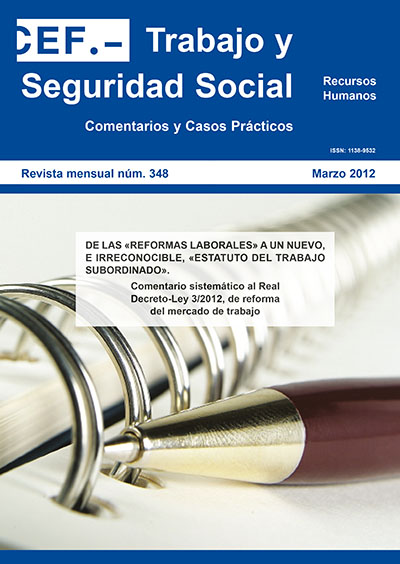From de labor reform to a new and unrecognizable «subordinate work statute»
Systematic comment for the Royal Decree-Law 3/2012, of labor market reform
DOI:
https://doi.org/10.51302/rtss.2012.3523Keywords:
labor market, employment policies, dismissal, labor reforms and «human capital»Abstract
Spain goes on a dramatically singularity of his labor relations model: even increasing, at least briefly, it’s destroying employment and when a decrease exponentially multiplies a loss of jobs. To face up continues to use the same therapy that time has shown its not good for the cure, rather the opposite: the reform of the rules governing the employment contract and collective bargaining, to what he calls synthetic, but not innocently, «labor market reform». This happened in 2010 and in 2011, and has happened in 2012, by Royal Decree-Law 3/2012 of 10 February.
On this deep reform there is multiple views of all types, both by economists and lawyers, either by political parties or by the social partners, business organizations, unions, and even citizenship in general. The radical nature of some of the flexibility measures introduced, such as all having to do with deregulation and lowering of dismissal, or the extension of the opt-out clauses and negotiating company, are leading to a strong tension between those who considered aggressive but necessary and those who have as devastating, «unfair» and «ineffective». The conflict is such that revives the myth of the general strike.
But in this study, the author has try to disassociate from one opinion analysis, certainly all legitimate, to throw into a thorough study, critical yes, but also very operational, practical, of each and every one of the novelties introduced by the umpteenth labor reform. Hence, the author proceeds to exhaustively compare each legislative decision with the previous legal situation, not in the now repealed legislative regulation and/or modified, but in the whole system of sources: case law –that now, as very relevant, is worth the paper– and collective bargaining. The result is a more detailed commentary that all critical points of this profound reform, that therefore, does not stay in the «headlines», but went to break up «the fine print».
The end result, however, overflow this and suggestive work of neat and thorough study of the changes, to propose a more disturbing conclusion, but perhaps less practical: we are not, no matter what anyone says, to a more labor reform, rather there has been a profound revision of the Workers’ Statute, as had been strengthened following the 1994 reform, as well as dozens of reforms from then. In sum, the Royal Decree-Law 3/2012 reform not only Workers’ Statute, but which, although not leading to a new, rather it is reviewed in depth –«revised Workers’ Statute»– in a direction that clearly distorts the balance achieved earlier, both in the management of individual employment relations –commodification of labor factor, emphasizing its status as a productive resource («human capital», «emple(g)ability»– as in industrial relations –dynamic model, «down» and decentralized of collectively bargain–.


















